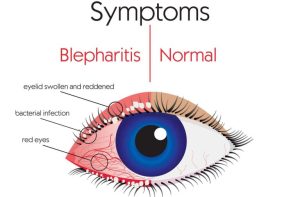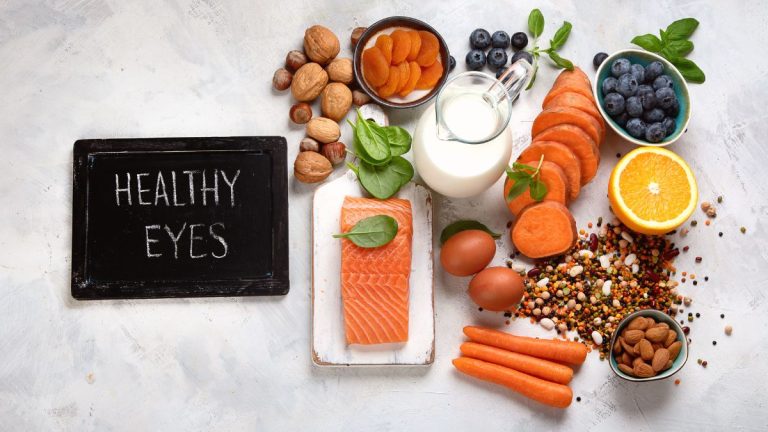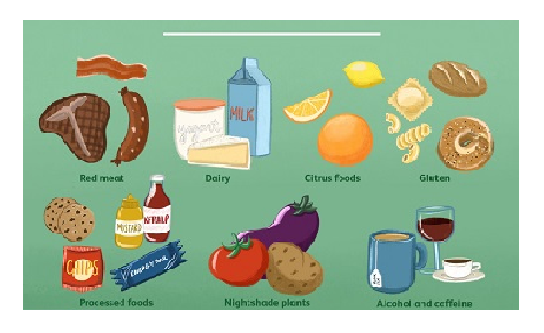Blepharitis
Blepharitis is a common eye condition that causes inflammation of the eyelids and can lead to uncomfortable symptoms such as itching, redness, and irritation. While there are various treatments available for blepharitis, one often overlooked aspect of managing this condition is through diet. Eating right for blepharitis can play a crucial role in reducing symptoms and improving overall eye health.
We will discuss the key nutrients and foods to include or avoid in your diet and supplements for blepharitis to help alleviate the symptoms of blepharitis and promote healthier eyes.
Blepharitis: Symptoms and Causes
Eating Right for Blepharitis is important, but before we delve into the nutrients and foods that can help manage this condition, let’s first understand its symptoms and causes. Blepharitis is characterized by inflammation of the eyelids, leading to uncomfortable symptoms such as itching, redness, and irritation.
This condition can be caused by a variety of factors, including bacterial infection, excessive oil production in the eyelids, allergies, or even underlying skin conditions. It’s crucial to identify the root cause of your blepharitis to effectively manage and treat it. By understanding the symptoms and causes, you can make eating right for blepharitis to alleviate your symptoms and improve your overall eye health.

Key Nutrients That Aid in Managing Blepharitis
Eating right for blepharitis involves incorporating key nutrients into your diet that can help manage this condition. One important nutrient is omega-3 fatty acids, which have anti-inflammatory properties and can reduce eyelid inflammation. Foods rich in omega-3s include fatty fish like salmon, flaxseeds, and walnuts.
Another nutrient is vitamin A, which plays a crucial role in maintaining healthy eyes and can alleviate dryness and irritation associated with blepharitis. Good sources of vitamin A include carrots, spinach, and sweet potatoes. Antioxidants like vitamin C and vitamin E can help reduce inflammation and promote eye health. Incorporating citrus fruits, berries, and almonds into your diet can provide these antioxidants. By including these key nutrients in your diet, you can aid in managing blepharitis and promote healthier eyes.
Foods to Include in Your Diet for Better Eye Health
In order to eating right for blepharitis, it’s important to include certain foods in your diet. These foods are rich in nutrients that can help alleviate symptoms and support overall eye health. Incorporating leafy greens like spinach and kale can provide essential vitamins such as A and C, which have been shown to reduce inflammation and improve eye health.

Carrots
Carrots are rich in beta-carotene, which your body converts into vitamin A. Vitamin A is crucial for maintaining good vision and preventing night blindness.
Leafy Greens
Spinach, kale, and other leafy greens are high in lutein and zeaxanthin, antioxidants that help protect your eyes from harmful high-energy light waves like ultraviolet rays.
Sweet Potatoes
Like carrots, sweet potatoes are a good source of beta-carotene, which supports healthy vision.
Citrus Fruits
Oranges, lemons, and grapefruits are rich in vitamin C, an antioxidant that may help reduce the risk of cataracts and age-related macular degeneration (AMD).
Blueberries
These berries are packed with antioxidants, particularly anthocyanin’s, which can help improve night vision and reduce the risk of cataracts and AMD.
Foods to Avoid to Prevent Aggravating Blepharitis
To prevent aggravating blepharitis, it’s important to be mindful of certain foods that can potentially worsen the condition. First on the list are foods high in saturated fats, such as processed snacks and fried foods. These can increase inflammation throughout the body, including the eyelids. Eating right for blepharitis increase the recovery process of blepharitis.

Fried and Processed Foods
High-fat, greasy foods can lead to the production of oils that might contribute to blepharitis symptoms. It’s best to limit your consumption of fried foods and highly processed, fatty snacks.
Dairy Products
Some people with blepharitis find that dairy products, particularly full-fat milk and cheese, can worsen their symptoms. You may want to try dairy alternatives like almond milk or soy-based products if dairy appears to be a trigger.
Sugary Foods
High-sugar foods and drinks can lead to inflammation in the body, which may exacerbate blepharitis. Reducing your sugar intake may help manage symptoms.
Alcohol
Alcohol can dehydrate your body, which can lead to dry eyes and worsen blepharitis symptoms. Limit your alcohol consumption and drink plenty of water to stay hydrated.
Caffeine
Some people may find that caffeine exacerbates dry eye symptoms, which can be related to blepharitis. Consider reducing your caffeine intake, especially if you notice a connection between caffeine and your symptoms.
Helpful Dietary Changes for Living with Blepharitis
Making helpful dietary changes is an important aspect of managing blepharitis and promoting healthier eyes. First and foremost, maintaining a balanced diet with plenty of fruits, vegetables, and lean proteins is crucial. This ensures you’re getting a wide range of nutrients that support eye health. Staying hydrated by drinking plenty of water can help alleviate dryness and discomfort associated with blepharitis. Avoiding processed foods, sugary drinks, and foods high in saturated fats eating right for blepharitis is also important, as they can contribute to inflammation.




